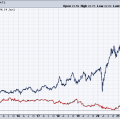Eli Lilly and Company (LLY) is well-known for its groundbreaking drug development that addresses several common and rare medical conditions. With a robust drug pipeline and strategic acquisitions, LLY, valued at $847.82 billion, is emerging as a formidable contender in the pharmaceutical industry, poised to reach a trillion-dollar market cap. Eli Lilly’s stock has had a solid run, surging around 61{3da602ca2e5ba97d747a870ebcce8c95d74f6ad8c291505a4dfd45401c18df38} year-to-date and more than 110{3da602ca2e5ba97d747a870ebcce8c95d74f6ad8c291505a4dfd45401c18df38} over the past year.
This article delves into Eli Lilly’s diverse drug pipeline, recent acquisitions and partnerships, and financial performance, highlighting why it represents a golden opportunity for investors.
Innovative Drug Pipeline
Eli Lilly’s success is primarily attributed to its innovative drug portfolio, which continues to drive significant revenue and earnings growth. Its product portfolio includes Mounjaro, a revolutionary weight-loss drug that has garnered substantial attention for its efficacy, setting new benchmarks in the weight management sector, and Trulicity, a leading diabetes medication that helps lower blood sugar levels and has become a staple in diabetes management.
Further, the company offers Verzenio, a crucial treatment for breast cancer, Taltz, which targets autoimmune dysfunctions and has proven effective in treating conditions like psoriasis and rheumatoid arthritis, and Jardiance, an oral medication to treat adults with type 2 diabetes, chronic (long-term) heart failure, and chronic kidney disease.
Additionally, Humalog®, a fast-acting insulin, is another cornerstone of LLY’s diabetes treatments, widely used by patients to manage their blood sugar levels effectively. Zepbound, a new addition, is an injectable medication for chronic weight management in adults with obesity or overweight with at least one weight-related condition, including high blood pressure, type 2 diabetes, or high cholesterol.
Recently, Eli Lilly’s Kisunla™ got approved by the FDA for treating adults with early symptomatic Alzheimer’s disease (AD), which includes people with mild cognitive impairment (MCI) and people with the mild dementia stage of AD with confirmed amyloid pathology.
In addition to these established medications, LLY is continuously expanding its pipeline with cutting-edge treatments. Pipeline progress includes optimistic results from two Phase 3 trials of tirzepatide for obstructive sleep apnea, submission of mirikizumab for Crohn’s disease in the U.S. and EU, resubmission of lebrikizumab for atopic dermatitis, and initiation of lepodisiran in a Phase 3 study for atherosclerotic cardiovascular disease.
Strategic Acquisitions and Partnerships
To diversify and strengthen its drug portfolio, Eli Lilly has strategically acquired Morphic Holding, Inc., a biopharmaceutical company specializing in oral integrin therapies for severe chronic conditions. Morphic’s lead development program is a selective oral small molecule inhibitor of ?4?7 integrin for the treatment of inflammatory bowel disease (IBD) that can potentially expand treatment options for patients.
This molecule, MORF-057, is currently being evaluated in two Phase 2 studies for ulcerative colitis and one Phase 2 study for Crohn’s disease. In addition, Morphic is developing a preclinical pipeline of other molecules aimed at treating autoimmune diseases, pulmonary hypertensive diseases, fibrotic diseases, and cancer. This acquisition broadens Eli Lilly’s therapeutic reach and underscores its commitment to addressing unmet medical needs.
Daniel Skovronsky, M.D., Ph.D., chief scientific officer of Eli Lilly, said, “We are eager to welcome Morphic colleagues to Lilly as this strategic transaction reinforces our commitment to developing new therapies in the field of gastroenterology, where Lilly has made significant investments to deliver first-in-class molecules for the benefit of patients.”
Also, in June, LLY announced a collaboration with OpenAI, enabling the company to utilize OpenAI’s generative AI to invent novel antimicrobials for treating drug-resistant pathogens. Antimicrobial resistance (AMR) is considered one of the foremost public health and development threats across the global health landscape. This partnership marks a groundbreaking step in combating the increasingly severe yet often overlooked threat of antimicrobial resistance.
Robust First-Quarter 2024 Results and Upbeat Full-Year Outlook
Eli Lilly’s financial performance in the first quarter of 2024 showcases its resilience and growth potential. For the quarter that ended March 31, 2024, LLY’s revenue increased 26{3da602ca2e5ba97d747a870ebcce8c95d74f6ad8c291505a4dfd45401c18df38} year-over-year to $8.77 billion, driven by 16{3da602ca2e5ba97d747a870ebcce8c95d74f6ad8c291505a4dfd45401c18df38} increases in volume and 10{3da602ca2e5ba97d747a870ebcce8c95d74f6ad8c291505a4dfd45401c18df38} due to higher realized prices. The volume surge was due to solid growth from Mounjaro, Zepbound®, Verzenio, and Jardiance.
LLY’s non-GAAP gross margin grew 33{3da602ca2e5ba97d747a870ebcce8c95d74f6ad8c291505a4dfd45401c18df38} from the year-ago value to $7.23 billion. The rise in gross margin was primarily driven by higher realized prices, favorable product mix, and improvements in production cost. The company’s non-GAAP net income and earnings per share were $2.34 billion and $2.58, compared to $1.46 billion and $1.62 in the same period of 2023, respectively.
Following an outstanding first-quarter performance, Eli Lilly raised full-year 2024 revenue guidance by $2 billion. Also, the company increased non-GAAP EPS guidance by $1.30 to be in the range of $13.50 to $14.
Bottom Line
LLY’s relentless focus on innovation, strategic acquisitions and collaborations, and expanding its drug pipeline ensures sustained growth and profitability. Its significant progress in addressing some of the world’s most critical healthcare challenges has led to a higher demand for its medicines. To support future growth, the company is making substantial pipeline investments and rapidly expanding its manufacturing capacity to ensure its incretin medicines reach more patients.
Moreover, in May, Eli Lilly more than doubled its investment in its Lebanon, Indiana, manufacturing site with a new $5.30 billion commitment, raising the company’s total investment in this site from $3.7 billion to $9 billion. This expansion will boost Lilly’s capacity to manufacture active pharmaceutical ingredients (API) for Zepbound® injection and Mounjaro®, allowing more adults with chronic diseases like obesity and type 2 diabetes to benefit from these vital treatments.
Analysts also remain highly bullish due to the pharma giant’s robust fundamentals and growth prospects. Berenberg analyst Kerry Holford recently raised the price target on Eli Lilly from $850 to $1,000 and maintained a Buy rating on the stock. Moreover, Barclays analyst Carter Gould maintained an Overweight rating for LLY and increased the price target from $913 to $1,025.
With its stock up more than 60{3da602ca2e5ba97d747a870ebcce8c95d74f6ad8c291505a4dfd45401c18df38} year-to-date, Eli Lilly is on a clear upward trajectory. If this trend continues, the company is well-poised to join the exclusive trillion-dollar stocks club, a milestone that signifies immense market confidence and stability. For investors seeking a resilient and growth-oriented pharma stock, LLY stands out as a prime choice, promising substantial returns in the long run.



